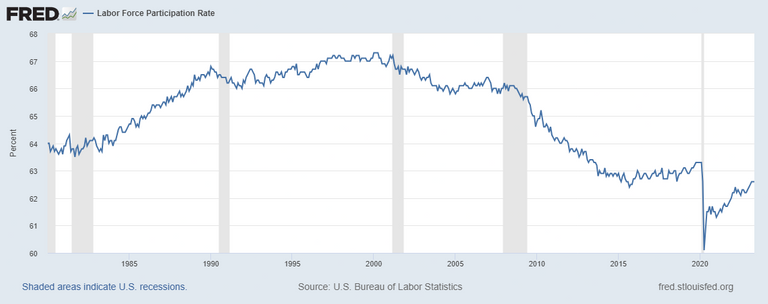The Deflationary Nature Of Technology
It is amazing to hear people discuss the future and espouse things such as massive inflation. To me, it is absolutely mind-boggling and shows little understanding of what is taking place. In fact, we have a few decades worth of evidence that shows us what the future will look like.
Technologists like to say that "technology has always created more jobs than it destoryed". This is espoused by the likes of Ray Kurzweil and Peter Diamandis. There is a problem with this: it is not true.
Sure this might have been the case a number of decades ago. However, when we look at what is taking place today, we see an entirely different story.
For this reason, let's dive into the technological impact on our future and what it means.
Technological Era
There is little dispute that the last quarter century was the most technologically advanced in human history. This is something that will only be eclipsed by the next 25 years. Actually, we might see more progress in the next ten since the acceleration is always in play.
Peter Diamandis is known for his 6Ds when it comes to technology. They are:
- digitization
- demonization
- dematerialization
- democratization
- deceptive
- disruptive
We can probably agree that most of this was prevelant over the last 25 years and it is only getting increasingly more common. Digitization is sweeping many industries, setting off a chain of events.
This is what the technological era looks like. It is insight into our future.
Demonitization
This is the crucial variable for the sake of this article. Another term for demonitization is deflation. This means that, over time, technological advance pushes the cost of products or services down. Repeatly, we mentioned music, video, communication, and information as examples of how this is the case.
Here is where a problem enters.
Where does deflation show up? Many claim that it is a good thing because prices come down. This is part of the mindset of inflation bad, deflation good. There is on problem with this: deflation is not all that good.
The impact of deflation is always felt in the jobs. This is something that even Karl Marx wrote about. Labor always feels the brunt of the impact.
It stands to reason. If companies are seeing their prices forced down, or under threat from technological disruption, they are likely to start cuttig jobs. We see this all the time.
Above, we talked about the last 25 years. There was a reason that time frame was chosen. Look at the labor participation rate in the United States.

As we can see, the peak of this was way back around 2000. Since that time, the percentage of non-institutionalized working age people working (or looking for work) has dropped and it did so by a large margin.
Here we harken back to the technological era. If technology demonotizes things, which is another word for deflation, and this shows up in jobs, we would expect a chart like this.
It all makes sense.
Aritificial Intelligence
Sometimes it is hard to see what is clear as day.
What is one of the major concerns with artifical intelligence, after the Skynet scenario? It is the loss of jobs. We hear this repeatedly how AI is going to eliminate jobs and that it is progressing at such a pace we cannot keep up.
All of these are valid claims. Of course, does anyone consider the impact this will have? how is this in any way inflationary? If large sections of people are being replaced by software and robots, that is deflationary.
Which means the idea that a future of massive inflation ahead of us is very unlikely. There could be massive price spikes due to temporary issues such as supply chain shocks or war. However, over the long term, if technology keeps advancing ahead, it is going to put a lot of downward pressure on economic conditions.
This will also be coupled by a demographic collapse in developed countries, another deflaitonary input.
Here we have a clear indication of the long term pressures the economy will face. For this reason, we are going to have to see an expansion of the money supply to fund further economic output to counterbalance these pressures. One of the major areas is technological advancement in the developed countries that are going to face worker issues due to demographics.
There will be people screaming about inflation but it will be more Chicken Little. Technology alone makes this impossible. When coupled with the demographic situation, the long term path is evident.
If you found this article informative, please give an upvote and rehive.

gif by @doze

logo by @st8z
Posted Using LeoFinance Alpha
Congratulations @taskmaster4450le! You have completed the following achievement on the Hive blockchain And have been rewarded with New badge(s)
Your next target is to reach 86500 replies.
You can view your badges on your board and compare yourself to others in the Ranking
If you no longer want to receive notifications, reply to this comment with the word
STOPTotally agree. tech helps spread services/things to the mass that were once only available to the elite. This is deflationary. It’s just awful how deflation is portrayed as a bad thing by media.
These are eye-opener ideas most economists are not aware of. We can interpret slowing inflation figures in China and USA by considering the increased productivity.
Well technology is a long term thing so I wouldnt say this is due to that. We are seeing the economy slow down which means China is not requiring as many natural resources. And supply chains are being resolved which helps on that end.
Posted Using LeoFinance Alpha